- Home
- Tom Stoppard
Lord Malquist & Mr. Moon: A Novel
Lord Malquist & Mr. Moon: A Novel Read online
Lord Malquist and Mr Moon
PLAYS
Rosencrantz and Guildenstern Are Dead*
Enter a Free Man*
The Real Inspector Hound*
After Margritte*
Jumpers*
Travesties*
Dirty Linen and New-Found-Land*
Every Good Boy Deserves Favour*
Night and Day
Dogg’s Hamlet and Cahoot’s Macbeth*
The Real Thing
Rough Crossing
Hapgood
Arcadia
Indian Ink
The Invention of Love*
Voyage: The Coast of Utopia Part I*
Shipwreck: The Coast of Utopia Part II*
Salvage: The Coast of Utopia Part III*
TELEVISION SCRIPTS
A Separate Peace
Teeth
Another Moon Called Earth
Neutral Ground
Professional Foul*
Squaring the Circle
RADIO PLAYS
The Dissolution of Dominic Boot
“M” Is for Moon Among Other Things
If You’re Glad I’ll Be Frank
Albert’s Bridge
Where Are They Now?
Artist Descending a Staircase
The Dog It Was That Died
In the Native State
SCREENPLAYS
Rosencrantz & Guildenstern Are Dead
Shakespeare in Love (with Marc Norman)
FICTION
Lord Malquist and Mr Moon*
Lord Malquist and Mr Moon
TOM STOPPARD
Copyright © 1966 by Tom Stoppard
Introduction copyright © 2005 by Tom Stoppard
All rights reserved. No part of this book may be reproduced in any form or by
any electronic or mechanical means, or the facilitation thereof, including
information storage and retrieval systems, without permission in writing from
the publisher, except by a reviewer, who may quote brief passages in a review.
Any members of educational institutions wishing to photocopy part or all of
the work for classroom use, or publishers who would like to obtain permission
to include the work in an anthology, should send their inquiries to
Grove/Atlantic, Inc., 841 Broadway, New York, NY 10003.
Printed in the United States of America
Published simultaneously in Canada
First published in 1966 by Ballantine Books
Library of Congress Cataloging-in-Publication Data
Stoppard, Tom.
Lord Malquist and Mr Moon / Tom Stoppard.
p. cm.
eBook ISBN-13: 978-0-8021-9537-1
I. Title: Lord Malquist and Mr Moon. II. Title.
PR6069.T6L6 2006
823’.914—dc22 2006040958
Grove Press
an imprint of Grove/Atlantic, Inc.
841 Broadway
New York, NY 10003
Distributed by Publishers Group West
www.groveatlantic.com
Introduction
ON THE RE-PUBLICATION of his only novel The Rock Pool ten years after its first appearance, Cyril Connolly remarked somewhere that here was the proof that his novel had lasted. I’m writing this from memory. It may be that Connolly merely observed that what was proven was that his novel had escaped oblivion, which would not be quite the same thing. But that was the gist. Lord Malquist and Mr Moon was published forty years ago (or thirty-nine and a bit) by Anthony Blond, and has turned up sporadically under different imprints a few times since.* And yet it seems to me that my novel has spent its whole life in oblivion. Occasionally I meet someone who claims to have read it, but I always take this to be a form of politeness. I don’t think I have ever seen a copy on anyone’s bookshelf but mine. I can’t remember its ever having been reviewed, but I see that Panther disinterred an amiable paragraph by Isabel Quigly in the Sunday Telegraph, and that Faber was able to quote three provincial newspapers on the 1980 paperback and (significantly?) the same three the next time they went in to bat for me.
I have three copies of the first edition, which sold in double figures, speaking loosely; there was a moment when Blond’s Lord Malquist and Mr Moon sold 67 copies, or some such number, in Venezuela – a mystery I never solved. I have never been to Venezuela. I remember going into Foyles’ bookshop in 1966 and being gratified to see a stack of Malquist-and-Moons on the New Fiction table. I counted them; there were twelve. A week or two later I went in again; there they were. I counted them again; there were thirteen! I saw at once what was happening. People were leaving my book at bookshops.
And now this. Could it be that my innocent novel has been sucked into a money-laundering operation fronted by an apparently respectable publisher? Anyway, in the absence of any public demand that I’m aware of, and in tribute to Faber’s never-say-die spirit, I have offered to write an Introduction to yet another edition of this little known but ‘highly imaginative and theatrical black comedy, with a cunningly contrived denouement whose absurdity is chillingly logical’ (Glasgow Herald). Furthermore, I have been looking into it.
*****
In 1964 I spent a few months in what was then called West Berlin in company with a handful of ‘promising young playwrights’, beneficiaries of the Ford Foundation. We lived in a house by the water at Wansee and were told we could spend our time doing anything we liked, preferably writing something. I spent a long time over a squib called ‘Rosencrantz and Guildenstern Meet King Lear’. In another room, Derek Marlowe (envied author of a play called ‘Seven Who Were Hanged’, which I think was performed at the Royal Court) was writing a play with a scarecrow in it. Piers Paul Read was writing his first novel, ‘Game in Heaven with Tussy Marx’. This ‘colloquium’ was my first major perk. I was impressed by Piers who seemed to be an old hand on the writers’ perks scene. I cut out a whisky ad from a magazine and stuck it on his door – ‘As long as you’re up, get me a Grant’. When we came back to England, we three shared a flat, once more each writing in his own room. In swinging London, it was Derek who seemed the most ‘connected’. He would tell us about his new friends who were in a rock band, The Who. He played ‘You’ve Lost That Lovin’ Feeling’ by the Righteous Brothers on ‘repeat’ while writing a spy novel. Piers and I used to tell him he was far too late to jump on the le Carré bandwagon, but one day he came home with an advance from Gollancz which seemed like riches, and quite soon he sold the film rights. That shut us up. Derek is dead before his time, leaving several admired novels behind him, none of which, I think, sold as well as A Dandy in Aspic.
Anthony Blond was a friend of my agent Kenneth Ewing. One day, Kenneth said that Anthony was willing to commission a novel from me. Such things happened on Planet 1965. I had no novel to write but I definitely wanted to be a published novelist so, as soon as I had done with Rosencrantz and Guildenstern (and in between writing a rent-paying serial for the BBC World Service about an Arab medical student in London), I got to work on my typewriter. To my amazement, Anthony at first jibbed at publishing the result but he relented and I remember receiving a telegram from Kenneth: BLOND WILL PUBLISH AND BE DAMNED. The book came out pretty much at the same time as the first production of Rosencrantz and Guildenstern Are Dead at the 1966 Edinburgh Festival. I had high hopes for the novel and very few for the play.
It’s years since I opened Lord Malquist and Mr Moon. In opening it now, the first thing that catches my eye is a flourish which I used in my play – ‘I clutch at straws, but what good’s a brick to a drowning man?’, Moon and Guildenstern ask in perfect harmony. Almost every random page brings bac
k a memory of magpie pickings from (mostly) other people. I feel tolerably safe from discovery. Who would guess (as I instantly remembered) that when Malquist speaks of the mourning of (the unnamed) Churchill being ‘imposed upon a sentimental people’, I was consciously recalling a favourite and far superior sentence in A. J. Liebling’s account of an English boxer years earlier: ‘a fat man whose gift for public suffering endeared him to a sentimental people’? My trick mind still retrieves such shiny objects intact even though I can never remember my mobile phone number. On another page I find a reference to the 13th-century Sir John Wallop ‘who so smote the French at sea that he gave a word to the language’. This came from a collection of pieces by John Squire with which I soothed myself during ‘flu at that time. The book is on the shelves behind me, inscribed by Squire, and somewhere in it is Malquist’s purloined observation that ‘the captain of Surrey kept a pair of gold scissors in his waistcoat pocket for cutting his return ticket’.
Overtaken by nostalgia, I could go on in this vein. But, turning critical, I detect aspects of more interest. Years later, in the theatre, I had a director who used to berate me for what he called ‘retroactive exposition’, and I see that I was already up to my tricks in the first chapter – a series of disconnected ‘absurd’ episodes awaiting their rational explanation. In fact, after years of thinking of myself as an erratic writer whose plays had much more to disconnect than to connect them, I can’t help noticing the conscious and unconscious recycling. I remembered that I gave Moon’s name to one of the two critics in The Real Inspector Hound but I had utterly forgotten that the second critic, Birdboot, shared his name with Malquist’s butler. These facts have absolutely no significance. ‘We’re spectators,’ says Rosencrantz to Guildenstern, or the other way round, and the chapter heading ‘Spectator as Hero’ would have done well enough as a title equally for the novel or the play, and even for the author’s philosophy of art in those happy days.
Contents
ONE
Dramatis Personœ and Other Coincidences
TWO
A Couple of Deaths and Exits
THREE
Chronicler of the Time
FOUR
Spectator as Hero
FIVE
The Funeral of the Year
SIX
An Honourable Death
ONE
Dramatis Personœ and Other Coincidences
I
‘WHEN THE BATTLE becomes a farce the only position of dignity is above it,’ said the ninth earl (the battle raging farcically beneath him). ‘On the day the Bastille fell Louis XVI of France returned home from the hunt and wrote in his private diary, Rien. I commend to you the dignity of that remark, not to mention its cosmic accuracy.’ He took a grip (lilac-gloved) on the door-frame (rosewood, mother-of-pearl) as the pair of pigeon-coloured horses rocked the coach up Whitehall under the mourning flags and across the Square, kicking dun-coloured pigeons into the air over the purple-and-white barricades that stood ready for the great funeral—
—and Moon, snatching at the tail-ends of recollection, trusting the echo in his skull to reproduce a meaning that had not touched him, scribbled with a kindergarten fist against the sway, and caught up – the comic inaccuracy of his remark – before the turn into Cockspur Street dragged his pen arabesque across the page. The bomb bumped in his pocket.
‘Nothing,’ said the ninth earl, ‘is the history of the world viewed from a suitable distance. Revolution is a trivial shift in the emphasis of suffering; the capacity for self-indulgence changes hands. But the world does not alter its shape or its course. The seasons are inexorable, the elements constant. Against such vast immutability the human struggle takes place on the same scale as the insect movements in the grass, and carnage in the streets is no more than the spider-sucked husk of a fly on a dusty window-sill. Ask me what changes have taken place on the moon in my lifetime and I will reply from my own observation – Rien!’
The horses cleared a path through the encroaching city and Moon scribbled on as best he could.
The ninth earl sighed. ‘I am an island, Mr Moon, and when the bell tolls it tolls for thee.’
Vast immutability of insects wrote Moon, despairing but without guilt, send not for whom the bell tolls, etc., by which contraction he was able to capture the next sentence whole – If they are all so obsessed with change they should begin by changing for dinner.
‘Very good, Lord Malquist!’ – hearty friend-of-the-nobility-Moon.
‘Well write it down, dear boy, write it down.’
‘Very good, Lord Malquist’ – Boswellian knows-his-station Moon.
And the ninth earl (entomological) looked appalled on the passing battle in Waterloo Place; and was reminded—
‘You may not know, dear boy, what the Duke of Wellington wore on his feet during the battle at Waterloo …?’
‘Boots, my lord?’
‘No doubt, but what kind of boots?’
‘What kind of boots Wellington wore?’ said Moon stupidly.
‘Exactly.’
‘Would they have been Wellington boots?’ he asked feeling that he had somehow spoilt it.
But the ninth earl was triumphant.
‘No!’ he snapped. ‘He wore Malquist boots!’ and smacked his stick against the polished leather of his calf.
‘Make a note of it, Moon. The fourth earl wore leather boots up to the knee and they created much interest at the time. Wellington never had an original idea in his life, about boots or anything else. He entered the language by appropriating the fruits of my family genius.’ He brooded bitterly for a moment. Moon wrote: Boots of family genius, and the ninth earl remarked without tone or point, ‘a man greeting a Mr Jones with the words The Duke of Wellington, I believe, received the reply, Yes. Can you lend me ten pounds until the end of the month.’
Up ahead at the far corner of Pall Mall and Marlborough Road a crowd had gathered. It grew as Moon watched. He tried to empty his mind but when he closed his eyes the crowd multiplied and began to pile up against the walls until it filled the city to its brim, a mass pressed wall to wall, blind prisoners packed into the city’s hold. He held his breath in the airless centre, and when he opened his eyes the buildings leaned into him. He started to interview himself, ritualistically, but could not synchronise real time with time in his head. He kept getting ahead of himself, and losing it, and starting again and losing it, like an exhausted man trying to get his prayers in before falling asleep. He put his hand into his overcoat pocket and palmed the smooth shell of his bomb.
‘I find crowds extraordinarily lacking,’ said the ninth earl. ‘Taken as a whole they have no sense of form or colour. I long to impose some aesthetic discipline on them, rearrange them into art. It would give a point to their existence.’ He sighed again. ‘Well then, descriptive notes… My hat is of a colour described by my hatter as pearl black. My pearl pinned to my lapel is of a colour described by my jeweller in literal translation from his native Chinese as sunkissed dewdrop on earlobe of bathing-in-pool maiden. My earlobes are gems of their kind. My Regency coat for gaming at the club is of a brocade as blue as the midnight sky over Firenze. My gloves are lilac, my hose is white, my cravat is of the palest blue silk, my boots are the hand-stitched hide of unborn gazelles and my stick is ebony, filigree-ed in silver. My malquist is slightly less pink than a sunrise though slightly less yellow than a sunset, and it is drawn by two dappled greys in black harness, and driven by a venerable coachman caped in mustard box-cloth who served as groom in my father’s stables and who has a wise Cockney wit, an example of which unaccountably fails to spring to mind.’
Moon had relapsed into interviewing himself. His hand wrote on as far as pink as pearl in ear of Chinese bathing beauty, at which point its memory gave out.
The crowd on the corner, trapped and released by the caprice of traffic, started to cross but fell back from the broadside arrogance of coach-and-pair, and Moon had to abandon his interview to prepare a face to acknowle
dge the loyalty of a populace who had turned out to line the streets for him; which he did by removing all expression from it. The ninth earl looked about him without malice or envy, but his eye was unwarily caught by a look of unmistakable contempt from a man with a bowler hat and a long sad moustache. Next to him a fat lady, differently affected, broke rank in a lumpy encumbered struggle towards the coach, waving something white, and came on, her mouth working around a message of some obscure desperation, thrusting the object-a tight roll of paper, loose end flying-at the window, and as it flapped once against the glass Moon caught the instant of her despair as the high wheel rode her down. All his tension exhaled in one unwinding breath.
‘If there were a time and place for petitions,’ said the ninth earl unloosening a fine gold mesh bag bulging with coins of an unbelievable luminosity, ‘it might possibly be just before dinner, and it could conceivably be in the middle of Pall Mall, but the meanest intelligence might surmise that it would not be both,’ and threw a handful of the coins into the road behind where they leapt away like panicked goldfish.
Up on the box the coachman cried in terror – ‘Blind schmuck! she’s mad already!’ – and the horses bolted.
‘Don’t lose your head, O’Hara!’ shouted the ninth earl. ‘Turn up St James!’
Moon twisted to look back through the rear pane. Several people were darting about in pursuit of coins. The man with the hat and the sad moustache was running after the coach with absurd futility. A ribbon of white paper was still unrolling itself across the street.
‘She’s not moving,’ he reported.

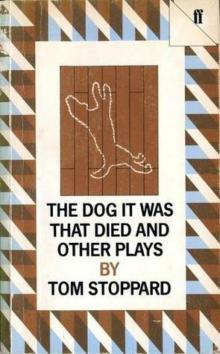 The Dog It Was That Died and Other Plays
The Dog It Was That Died and Other Plays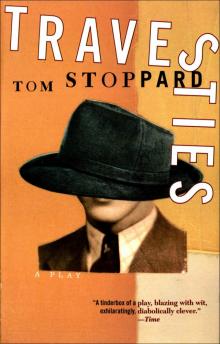 Travesties
Travesties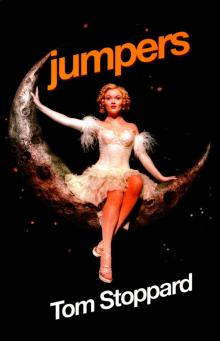 Jumpers
Jumpers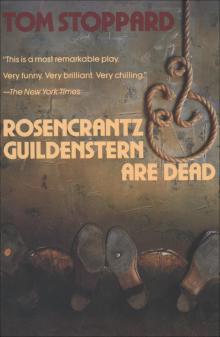 Rosencrantz and Guildenstern Are Dead
Rosencrantz and Guildenstern Are Dead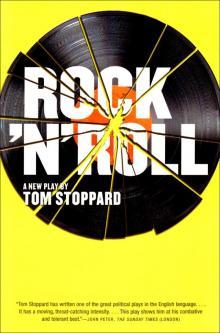 Rock 'N' Roll
Rock 'N' Roll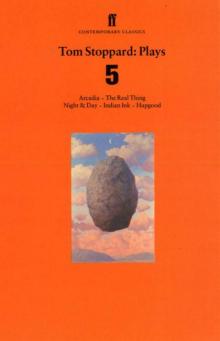 Plays 5
Plays 5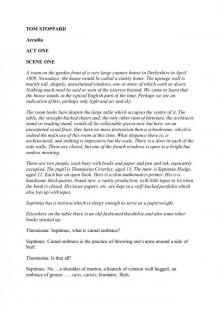 Arcadia
Arcadia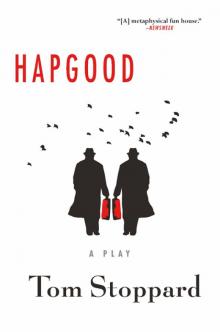 Hapgood
Hapgood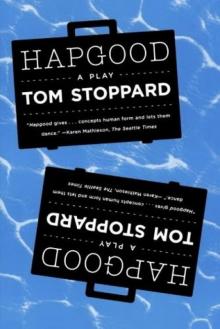 Hapgood: A Play
Hapgood: A Play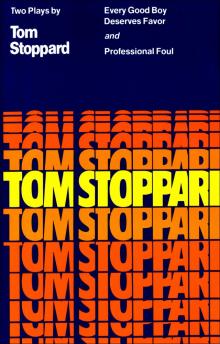 Every Good Boy Deserves Favor & Professional Foul
Every Good Boy Deserves Favor & Professional Foul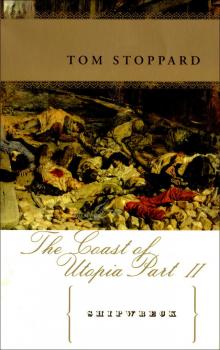 The Coast of Utopia: Voyage, Shipwreck, Salvage
The Coast of Utopia: Voyage, Shipwreck, Salvage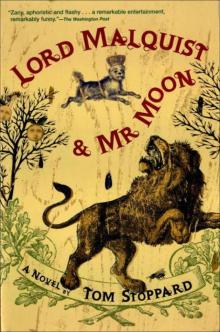 Lord Malquist & Mr. Moon
Lord Malquist & Mr. Moon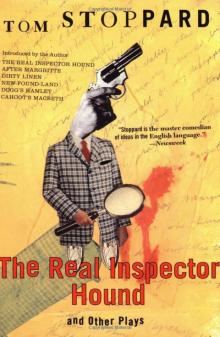 The Real Inspector Hound and Other Plays
The Real Inspector Hound and Other Plays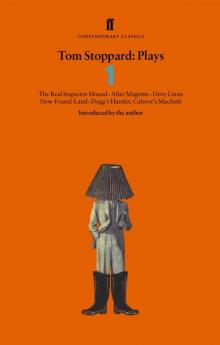 Tom Stoppard Plays 1
Tom Stoppard Plays 1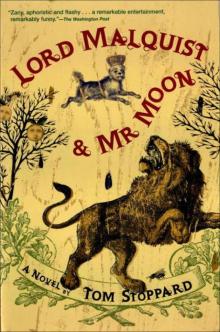 Lord Malquist & Mr. Moon: A Novel
Lord Malquist & Mr. Moon: A Novel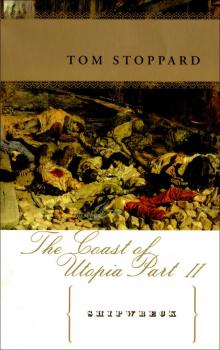 Shipwreck
Shipwreck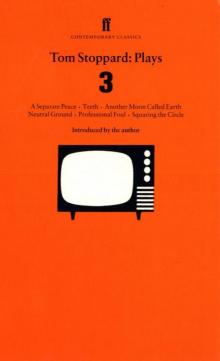 Tom Stoppard Plays 3
Tom Stoppard Plays 3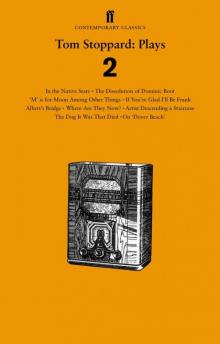 Tom Stoppard Plays 2
Tom Stoppard Plays 2 Rosencrantz and Guildenstern are dead. Arcadia
Rosencrantz and Guildenstern are dead. Arcadia